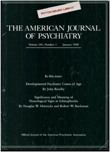Major depression with mood-congruent or mood-incongruent psychotic features: outcome after 40 years
Abstract
Using cross-sectional evaluations 40 years after index admissions, the authors compared depressed patients with mood-congruent and those with mood-incongruent psychotic features. These patients were then compared with patients with nonpsychotic major depression, schizophreniform disorder, or schizophrenia. Outcome in the mood-congruent group resembled that in the nonpsychotic group and was significantly better than that in the mood-incongruent group. Patients in this latter group, however, had significantly better follow-up scores than did schizophrenic patients. These findings are consistent with a short-term outcome and family history study and suggest that patients with major depression and mood-incongruent psychotic features constitute a more diagnostically heterogeneous group than do those with mood-congruent psychotic features.
Access content
To read the fulltext, please use one of the options below to sign in or purchase access.- Personal login
- Institutional Login
- Sign in via OpenAthens
- Register for access
-
Please login/register if you wish to pair your device and check access availability.
Not a subscriber?
PsychiatryOnline subscription options offer access to the DSM-5 library, books, journals, CME, and patient resources. This all-in-one virtual library provides psychiatrists and mental health professionals with key resources for diagnosis, treatment, research, and professional development.
Need more help? PsychiatryOnline Customer Service may be reached by emailing [email protected] or by calling 800-368-5777 (in the U.S.) or 703-907-7322 (outside the U.S.).



